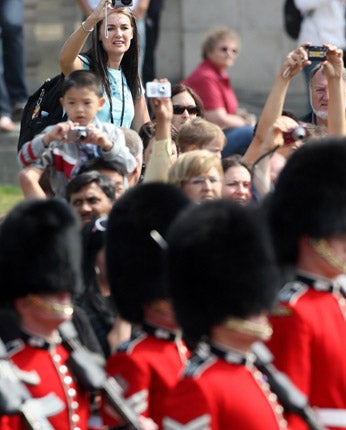Simon Calder: The real reason travel bosses are dewy-eyed
The man who pays his way

Your response to the news? Somewhere on the happiness spectrum from thinking "Oh, that's nice" to unbounded joy.
That could apply to the release from house arrest of the Burmese pro-democracy campaigner, Aung San Suu Kyi, but for the moment let's address the week's other positive story: the engagement of Prince William and Kate Middleton.
Judging from the flood of travel press releases the announcement triggered, you might imagine the travel industry is as overjoyed as the couple's families. Irish Ferries was ahead of the pack, offering the Prince and his bride-to-be unlimited free travel on the car ferry between Holyhead and Dublin for as long as the couple reside on Anglesey.
That was swiftly trumped by an invitation to Eskaya, a spa resort in the Philippines where treatments are based on tribal healing traditions (which may appeal to the Royal Family). Two minutes later, publicists for Ackergill Tower in Caithness threw their crown into the ring as a possible wedding venue. As well as "team-building and development" it offers video-conferencing, a cost-cutting solution for these austere times.
While many people have focused on the cost of the event to the public purse, far more important, in terms of earnings and jobs, is the effect on travel patterns. These press releases are mere soggy confetti compared with the hit the travel business will take from the happy event.
Britain's tourism industry will certainly get a long-term boost from wide-screen free publicity for everywhere from the couple's home in north-west Wales to Westminster. In the short term, though, travel-industry bosses will get dewy-eyed over finance, not romance. Whether they are in business selling tourism in Britain, or trying to flog package holidays abroad, the likely impact on earnings will be enough to make them weep.
***
A royal wedding must mean great news for London, surely? Well, if you happen to own a top-class hotel in the capital, the guest list for the noble nuptials will provide plenty of high-end clients. Add the media circus that will accompany the wedding of the decade, and every four- and five-star property within confetti-drifting range of Westminster Abbey is likely to be fully booked at top rates.
Premium airlines such as British Airways and Virgin Atlantic will also do well. They usually rely on transfer traffic to help fill their planes. This is better than flying empty seats – but BA and Virgin earn less from passengers flying, say, from Boston to Johannesburg via London than they do from travellers starting or ending in the capital. As demand soars, they can turn off the transfer business and cash in on "end-to-end" traffic, at much higher average fares.
Down among the cheap seats and less-expensive beds, though, the "love dividend" vanishes. Budget hotels and no-frills airlines operate close to capacity all year, tweaking prices to match supply with demand. And while you can expect a spike in bookings to London just before the great event, and from the capital the day after, the corresponding halves of such flights (and Eurostar trains) could prove as empty as a champagne glass after the loyal toast.
Beyond London, the rest of the UK travel industry will suffer. That's because so many inbound tourists are funneled through the capital. If a disproportionate amount of capacity to London is filled with travellers venturing no further than the M25, overseas holidaymakers hoping to head for the Highlands or explore York, Chester and Bath could be priced out of the market. For travellers keen to explore the UK without the crowds, the weekend of the wedding will prove ideal.
Not on the guest list? Bag a bargain
When the royal engagement was announced on Tuesday, purveyors of package holidays were desperate for the answer to one key question. Not the location, choice of best man or colour of the Queen's hat – but the date.
The outbound travel industry quickly concluded there was no ideal date. Events from the World Cup to a General Election keep Brits at home in their millions, and the royal wedding will decimate demand for package holidays. The bookies' early favourite was May, when tour operators switch to summer capacity – tough to sell at the best of times. A July wedding, also strongly fancied, implied heavy discounting in peak season. And the flurry of late betting on March caused consternation among ski companies.
The marriage gives unromantic travellers a chance to snap up a real bargain on a cut-price package – or a long-haul trip, perhaps to a brighter Burma.
Subscribe to Independent Premium to bookmark this article
Want to bookmark your favourite articles and stories to read or reference later? Start your Independent Premium subscription today.

Join our commenting forum
Join thought-provoking conversations, follow other Independent readers and see their replies